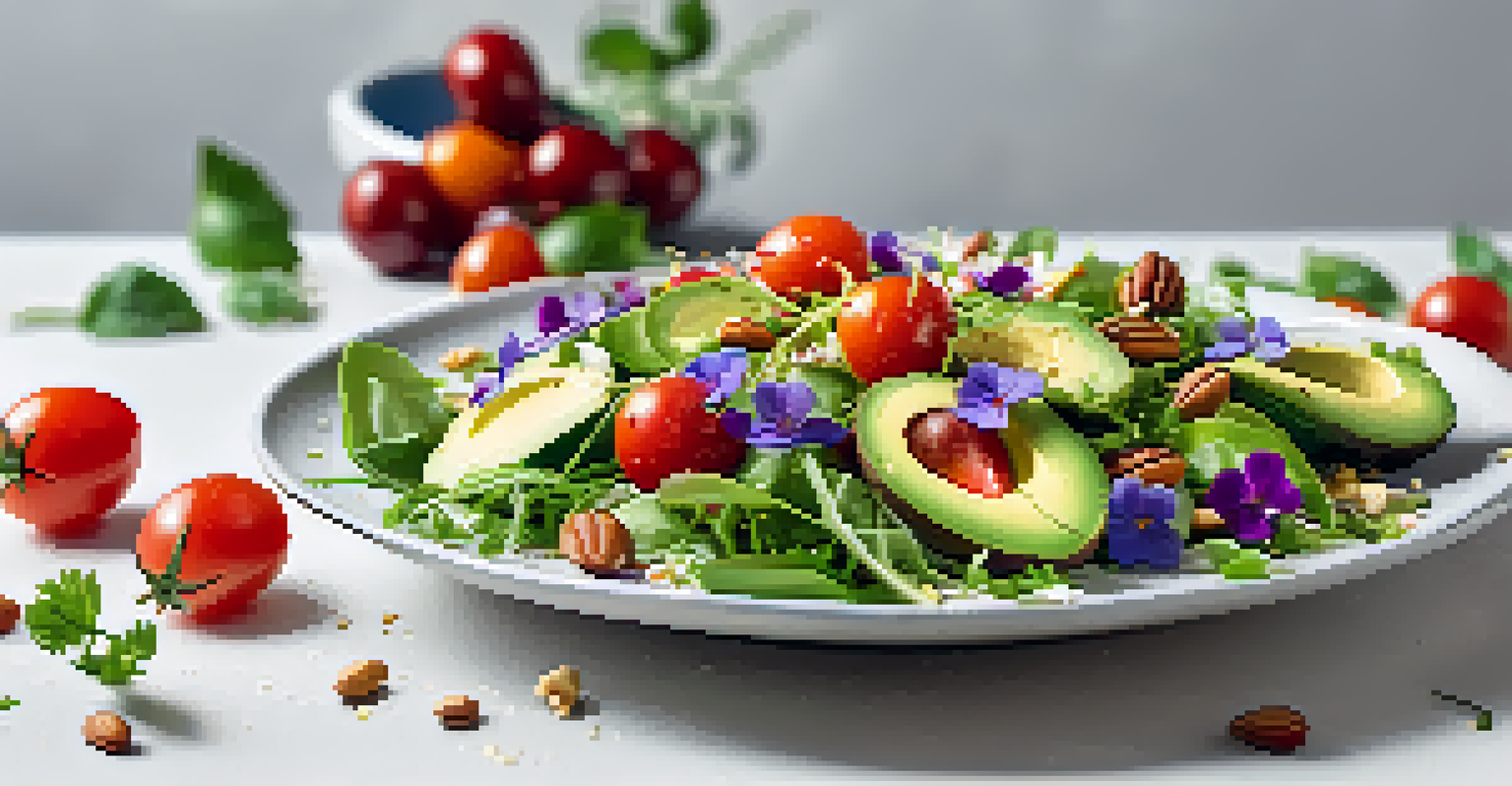You Can Get All Nutrients from Raw Foods: Is This True?

Understanding Raw Foods and Their Nutritional Appeal
Raw foods refer to uncooked, unprocessed, and often organic foods that are consumed in their natural state. They include fruits, vegetables, nuts, seeds, and grains. Many people are drawn to raw foods because of their vibrant flavors and potential health benefits, such as increased energy and improved digestion.
Let food be thy medicine and medicine be thy food.
The appeal of raw foods lies in their nutrient density. When food is cooked, some nutrients can diminish, especially heat-sensitive vitamins like vitamin C and certain B vitamins. This has led many to believe that eating raw foods is the best way to maximize nutrient intake.
However, while raw foods can be nutritious, it's essential to consider the balance and variety in your diet. Eating solely raw foods can lead to nutrient deficiencies if certain food groups are excluded, so understanding what each type of food contributes is crucial.
Nutrient Bioavailability: Raw vs. Cooked Foods
Bioavailability refers to how well our bodies can absorb and utilize the nutrients from food. Interestingly, some nutrients are more bioavailable in cooked foods than in raw ones. For example, cooking tomatoes increases the availability of lycopene, a powerful antioxidant, which is less accessible when consumed raw.

Similarly, certain vegetables like carrots and spinach also release more nutrients when cooked. The heat from cooking breaks down cell walls, making it easier for our bodies to access these vitamins and minerals. This highlights the complexity of nutrition and the need for a balanced approach.
Raw Foods Offer Nutritional Benefits
Raw foods contain valuable nutrients, but a balanced diet is essential to avoid deficiencies.
Ultimately, while raw foods can offer a plethora of vitamins and enzymes, some nutrients are better absorbed when food is cooked. This doesn't mean raw foods are inferior; rather, a combination of both raw and cooked foods might be the key to a well-rounded diet.
The Importance of Variety in a Nutrient-Dense Diet
Eating a wide variety of foods is vital for obtaining all the essential nutrients your body needs. Different foods offer unique vitamins, minerals, and phytochemicals that contribute to overall health. For instance, while raw spinach is rich in iron, cooking it can reduce oxalic acid, enhancing iron absorption.
The food you eat can either be the safest and most powerful form of medicine or the slowest form of poison.
Incorporating a range of food types—raw, cooked, and fermented—can provide a more comprehensive nutrient profile. This diversity not only ensures that you're getting all the necessary nutrients but also keeps meals interesting and flavorful.
Moreover, different cooking methods can enhance the taste and texture of certain foods, making them more enjoyable to eat. So, while raw foods can be a fantastic part of your diet, they should complement, rather than replace, other food preparation methods.
Potential Risks of a Strict Raw Food Diet
While a raw food diet can be beneficial, it also comes with potential risks. For instance, certain foods, like legumes and some vegetables, contain anti-nutrients that can interfere with nutrient absorption. Cooking can deactivate these compounds, making the food safer and more nutritious.
Additionally, a strict raw food diet may lead to deficiencies in specific nutrients like vitamin B12, iron, and omega-3 fatty acids, which are primarily found in animal products. Those following a raw food lifestyle must be mindful of these nutrients and consider supplementation if necessary.
Cooking Enhances Nutrient Absorption
Some nutrients become more bioavailable when foods are cooked, highlighting the importance of both raw and cooked options.
It's also worth noting that raw foods can be harder to digest for some individuals, leading to gastrointestinal discomfort. Listening to your body and consulting with a healthcare provider can help you make informed dietary choices.
The Role of Enzymes in Raw Foods
One of the key arguments for raw food diets is the presence of enzymes, which are believed to aid in digestion and overall health. Proponents claim that consuming raw foods helps preserve these enzymes, which can be destroyed during cooking. However, our bodies naturally produce enzymes to aid digestion, raising questions about the necessity of consuming raw foods for this purpose.
While raw foods do contain enzymes, they may not have a significant impact on digestion compared to the enzymes produced by our bodies. Furthermore, many cooked foods can also promote digestive health through their fiber content, which supports gut health and regularity.
Incorporating both raw and cooked foods allows for a balanced intake of nutrients and enzymes, ensuring your body has everything it needs to function optimally.
How to Incorporate Raw Foods into Your Diet
If you're interested in exploring raw foods, start by incorporating them gradually into your meals. You can add fresh fruits and vegetables to breakfast smoothies, or create salads packed with colorful produce for lunch. Experimenting with raw snacks, like nuts, seeds, and energy balls, can also be a fun way to include more raw options.
It's essential to balance raw foods with cooked meals for optimal nutrition. Consider alternating between raw and cooked vegetables, or try lightly steaming some veggies to preserve their nutrients while making them easier to digest.
Variety is Key for Optimal Nutrition
Incorporating a diverse range of foods and preparation methods ensures a comprehensive intake of essential nutrients.
Additionally, consider trying out raw food recipes that include a variety of ingredients. Raw soups, salads, and even desserts can be a delicious way to enjoy the benefits of raw foods while keeping your diet diverse.
Final Thoughts: A Balanced Approach to Nutrition
In conclusion, while raw foods can be a valuable part of a healthy diet, they should not be viewed as the only source of nutrients. The truth is that both raw and cooked foods offer unique benefits, and a balanced approach is key to achieving optimal nutrition. Incorporating a variety of food preparation methods can help you enjoy the best of both worlds.
Ultimately, it's about finding what works best for your body and lifestyle. Listening to your body's signals and making informed choices will guide you towards a nutrient-rich, satisfying diet.

So, whether you’re a raw food enthusiast or someone who enjoys cooked meals, remember that variety and balance are your best friends on the journey to better health.